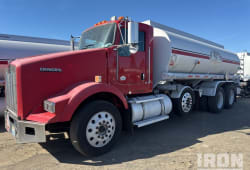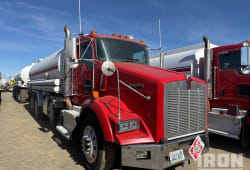Trending: The Rising Market for Service Trucks in Transportation
8 Lectura mínima
)
enero 6, 2024
Service trucks are becoming the unsung heroes of the transportation industry, quietly but efficiently supporting the movement of goods and services across the country. In recent years, the demand for these versatile vehicles has seen a remarkable surge, reshaping the landscape of the transportation sector. Let's delve into the reasons behind the rising market for service trucks and their indispensable role in the ever-evolving world of transportation.
Understanding the Role of Service Trucks
Versatility in Action
These also known as utility trucks, are engineered for adaptability, serving a range of functions crucial to diverse industries. Whether transporting tools and equipment or delivering on-site services, these trucks play an indispensable role in ensuring the seamless operation of various sectors. Their versatility positions them as valuable assets within the transportation industry, where their ability to perform multifaceted tasks contributes to the overall efficiency and functionality of operations.
On-the-Go Maintenance and Repairs
One of the primary reasons for the growing demand for these trucks in the transportation industry. The primary reason behind this growing demand is the unique capability of service trucks to carry out maintenance and repairs while in motion. These trucks are equipped with specialized tools and machinery, allowing them to effectively deal with mechanical issues that may arise during transportation operations.
The functions go beyond merely transporting goods-they serve as mobile workshops, ready to address a variety of mechanical challenges on the spot. This includes conducting routine inspections to identify potential issues before they escalate into major problems. By having the necessary tools and equipment on board, they can provide immediate solutions to any unforeseen mechanical setbacks.
The significance of this capability lies in its potential to reduce downtime for transportation companies. Downtime refers to the period during which a vehicle is out of operation due to maintenance, repairs, or unexpected breakdowns. In the fast-paced world of transportation, minimizing downtime is crucial for meeting delivery schedules and keeping operations running smoothly.
They act as a preventive and responsive measure, ensuring that any mechanical issues are promptly addressed, thus preventing more significant problems that could result in extended periods of inactivity. By offering on-the-go maintenance and repairs, these trucks contribute to the overall efficiency of transportation companies, allowing them to deliver goods in a timely manner and meet the demands of an ever-evolving market.
Efficiency Boosters
Efficiency is the key to success in the transportation industry. These trucks act as efficiency boosters by minimizing delays caused by unexpected breakdowns or malfunctions. A well-equipped fleet of these services plays a crucial role in maintaining and repairing vehicles promptly, ensuring that unexpected issues are addressed swiftly. This proactive approach helps companies in the transportation sector to optimize their overall operational efficiency. As a result, they can meet tight delivery schedules and fulfill customer expectations effectively. Essentially, the key to success in the transportation industry lies in minimizing disruptions and maximizing efficiency, and they contribute significantly to achieving this goal.
Market Trends and Driving Forces
1. Increased Reliance on Logistics
The growing need for these trucks is directly connected to the expanding reliance on logistics and supply chain management. This heightened demand is particularly evident in the context of the booming e-commerce industry, where there is an urgent requirement for rapid and effective transportation solutions. They are equipped with specialized tools and expertise and play a pivotal role in addressing issues promptly. As a result, they have become an integral component of modern logistics systems, playing a crucial role in maintaining the seamless flow of goods and services within the dynamic landscape of today's transportation industry.
In simpler terms, as the demand for quick and reliable transportation increases, especially in the context of the thriving e-commerce sector, these trucks are essential. These trucks are ready to tackle problems on the spot, ensuring that goods and services move smoothly through the complex and fast-paced world of transportation. Their role is not just beneficial; it's fundamental to keeping the supply chain running efficiently in today's rapidly changing transportation environment.
2. Technological Advancements
The growing demand for them is intricately connected to the expanding reliance on logistics and supply chain management. As the e-commerce industry continues to thrive, there is a heightened need for rapid and effective transportation solutions. They are equipped with specialized tools and expertise, and play a pivotal role in addressing issues promptly. In the contemporary transportation industry, they have become an integral component of modern logistics systems. Their significance lies in ensuring the uninterrupted flow of goods and services, contributing to the seamless operation of today's dynamic transportation landscape.
3. Focus on Preventive Maintenance
The transportation industry is shifting towards a proactive approach to vehicle maintenance. Traditionally, vehicle maintenance has often been reactive, meaning repairs and inspections occur in response to a breakdown or malfunction. However, there is a growing move towards a proactive approach, and trucks are at the forefront of this shift.
In this proactive paradigm, trucks are taking on a crucial role by providing preventive maintenance services. This involves regularly scheduled inspections and repairs aimed at identifying and addressing potential issues before they develop into more serious problems. Essentially, it's a strategy focused on preventing breakdowns rather than merely responding to them.
The primary goal of this proactive approach is twofold. Firstly, it aims to reduce overall maintenance costs. By addressing potential issues early on, the need for extensive repairs or replacements is minimized. This not only saves on the direct costs of repairs but also helps avoid the indirect costs associated with downtime, delays, and the domino effect on other operational aspects.
Secondly, this proactive maintenance approach contributes to the longevity of the entire fleet. By addressing wear and tear, replacing worn-out components, and fixing minor issues promptly, trucks can operate more efficiently and have an extended lifespan. This is particularly crucial in the transportation industry, where the reliability of the fleet is directly linked to the success of operations.
Meeting Industry Challenges
Addressing the Skilled Labor Shortage
The a growing need for proficient technicians who can effectively operate and maintain them in the transportation industry. As the demand increases, companies are recognizing the importance of having skilled professionals to handle these vehicles.
To address the rising demand for skilled technicians, companies are taking proactive measures by investing in training programs. These programs are designed to equip individuals with the necessary knowledge and expertise to operate and maintain them efficiently. By doing so, companies aim to bridge the existing skills gap in the industry and ensure that their service truck fleets are managed by competent professionals.
The proactive approach involves a strategic commitment to training initiatives, enabling employees to acquire the specific skills required for working with these trucks. This investment in workforce development is essential for overcoming the challenge of a shortage of skilled labor in the transportation sector. As technology evolves and becomes more sophisticated, having well-trained technicians becomes crucial for the seamless operation and maintenance of these vehicles.
Environmental Considerations
In response to an increasing focus on sustainability, the transportation sector is actively exploring alternative options that are more environmentally friendly. Specifically, electric and hybrid trucks designed for service purposes are gaining popularity. These vehicles offer a cleaner and more sustainable choice for companies seeking to minimize their impact on the environment and reduce their carbon footprint.
Electric trucks rely on electricity as their primary power source, often sourced from renewable energy, while hybrid trucks combine traditional fuel sources with electric propulsion. Both types aim to reduce reliance on conventional fossil fuels, contributing to lower emissions and environmental impact.
As global awareness of climate change and environmental issues grows, businesses are recognizing the importance of adopting eco-conscious practices. Choosing electric or hybrid utility trucks aligns with these sustainability goals and allows companies to play a part in mitigating the environmental impact associated with transportation activities.
Furthermore, as governments and regulatory bodies worldwide tighten environmental standards, companies are under increasing pressure to comply with more stringent regulations. The shift towards cleaner alternatives in the transportation sector, including the use of electric and hybrid utility trucks, is expected to gain even more momentum as these regulations become more demanding.
Conclusion
The surging demand for these trucks in the transportation industry is a testament to their indispensable role in maintaining the smooth flow of goods and services. From preventive maintenance to on-the-go repairs, these versatile vehicles are shaping the future of transportation. As the market continues to evolve, businesses must stay ahead of the curve by embracing technological advancements and adapting to the changing landscape. These trucks are not just vehicles; they are strategic assets that contribute to the success and efficiency of the entire transportation ecosystem.
As businesses navigate the evolving landscape of transportation, investing in a reliable fleet of these trucks is paramount. Explore the latest innovations and ensure your company stays ahead in this dynamic industry. Contact our experts to discover how service trucks can transform your operations and contribute to your success.














